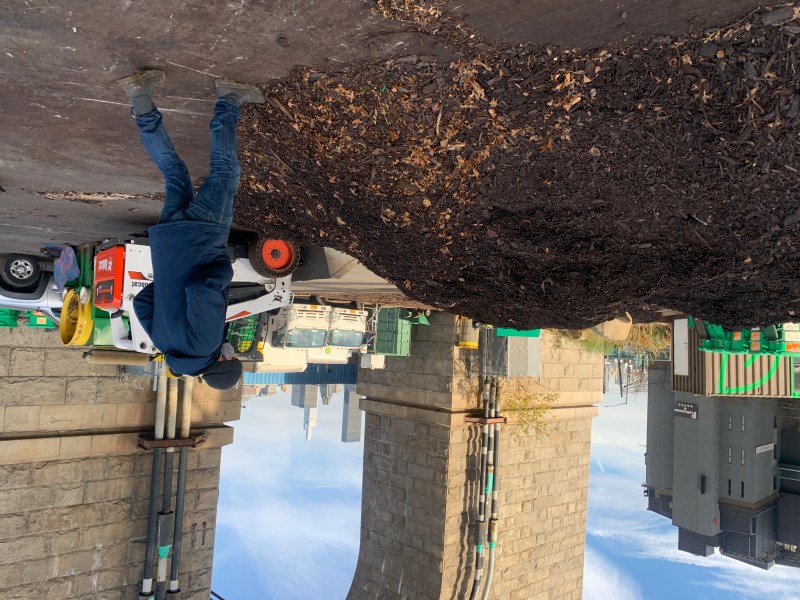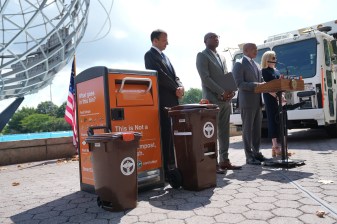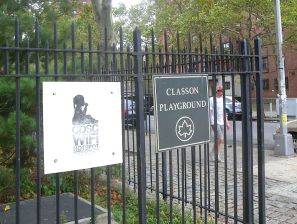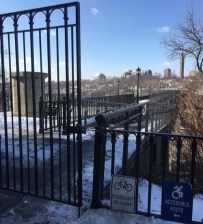Parks Department Closes Environmental Facility to Create a Parking Lot

They evicted paradise to fill up a parking lot.
The Parks Department has decided to boot a composting facility that transformed a garbage-strewn lot under the Queensboro Bridge into a community resource that provides high-quality soil for borough gardeners (and the Parks Department itself!) so the agency can instead create more parking for its own vehicles and “operational elements.”
The operators of the Big Reuse composting facility remain shocked at the agency’s decision to not renew its agreement with the environmental group.
“There is no reason to kick us off, except that [Parks] Commissioner Mitchell Silver does not feel there should be composting on parks land,” said Big Reuse Executive Director Justin Green, who had broken the news on Instagam. “But we are adding value to park land. We take yard waste and food scraps and turn it into compost for community gardens and for the Parks Department, too. So if we close down, that means less composting, which means more greenhouse gases for the city.”
Green added, “If we were in the way of something useful, I would understand, but we are useful! They say they need the land for parking, but it’s an excuse because they don’t like composting.”

Officially, Parks Department spokeswoman Charisse Hill said that the Big Reuse site would, indeed, be used for “crucial operational needs” such as parking of Parks Department vehicles, but the move would “better serve parkgoers … by freeing up other spaces in the park for recreational purposes.”
She added that Parks will relocate some “operational elements” currently inside Queensbridge Park to the Big Reuse space and that Parks land along Vernon Boulevard “will be redesigned to allow for public access and recreational amenities —we are in the beginning stages of this re-design.”
She declined to provide more details, citing its preliminary nature.
The Council Member who represents that part of Queens doesn’t buy the Parks Department’s claim.
“The eviction of Big Reuse is not only wrong, but it cements the city’s shameful policy of walking away from composting and a more sustainable future that literally could leave no waste unturned,” said Council Member Jimmy Van Bramer. “But to do this so that this site would become a parking lot is an absolute disgrace.”
There is some speculation that Commissioner Silver does, in fact, oppose composting inside Parks facilities. In addition to Big Reuse, the Lower East Side Ecology Center is facing a Dec. 31 eviction from its facility in East River Park due to the upcoming East Side Coastal Resiliency Project — but the Parks Department has not made any temporary site available, a common practice.

“We don’t know why they’re doing this,” said Christine Datz-Romero, the executive director of the Lower East Side Ecology Center, which has been in East River Park since 1998. “The Parks Department is supposed to be a steward for natural recourses — and one of the natural resources we have is food scraps that can be turned into soil to revitalize our green spaces.
Like Green, Datz-Romero thinks the stated reason for the eviction of composters is bunk.
“I’d like Commissioner Silver to have a public statement about this, but if you ask him, there’s just no response,” she said. “I won’t speculate on his thoughts, but Parks has definitely shifted away from hosting community composters to being hostile. We don’t understand why. Our program fights climate change. It’s a win-win.”
Composting is a big deal for Big Reuse and the Lower East Side Ecology Center, both of which annually collect more than one million pounds of of food waste that would otherwise end up in landfills and convert it to rich soil that benefits local gardeners and city agencies. The composing process also prevents the food waste from releasing methane as it decomposes because composting is an aerobic process as opposed to the anaerobic process in a landfill.
“So not only are we better for the climate, but we bring biological activity back into the soils of New York, which have been degraded over time,” Green said. “Our mission is to help green the city. Meanwhile, the Parks Department says it needs this space for parking. They have plenty of space under the bridge. So really, we’re getting pushed off because Parks doesn’t want to cooperate with the city’s effort to compost food scraps.”
The closure of Big Reuse and the Lower East Side facility — coming after the decision to end the city’s curbside composting program — means that, overnight, the city will lose half of its remaining composting capacity, said Devin Reitsma, also of Big Reuse.
It also raises issues about the city’s commitment to reducing its greenhouse gas footprint.
Here’s a slideshow of just some of the things that city agencies park under the Queensboro Bridge:


